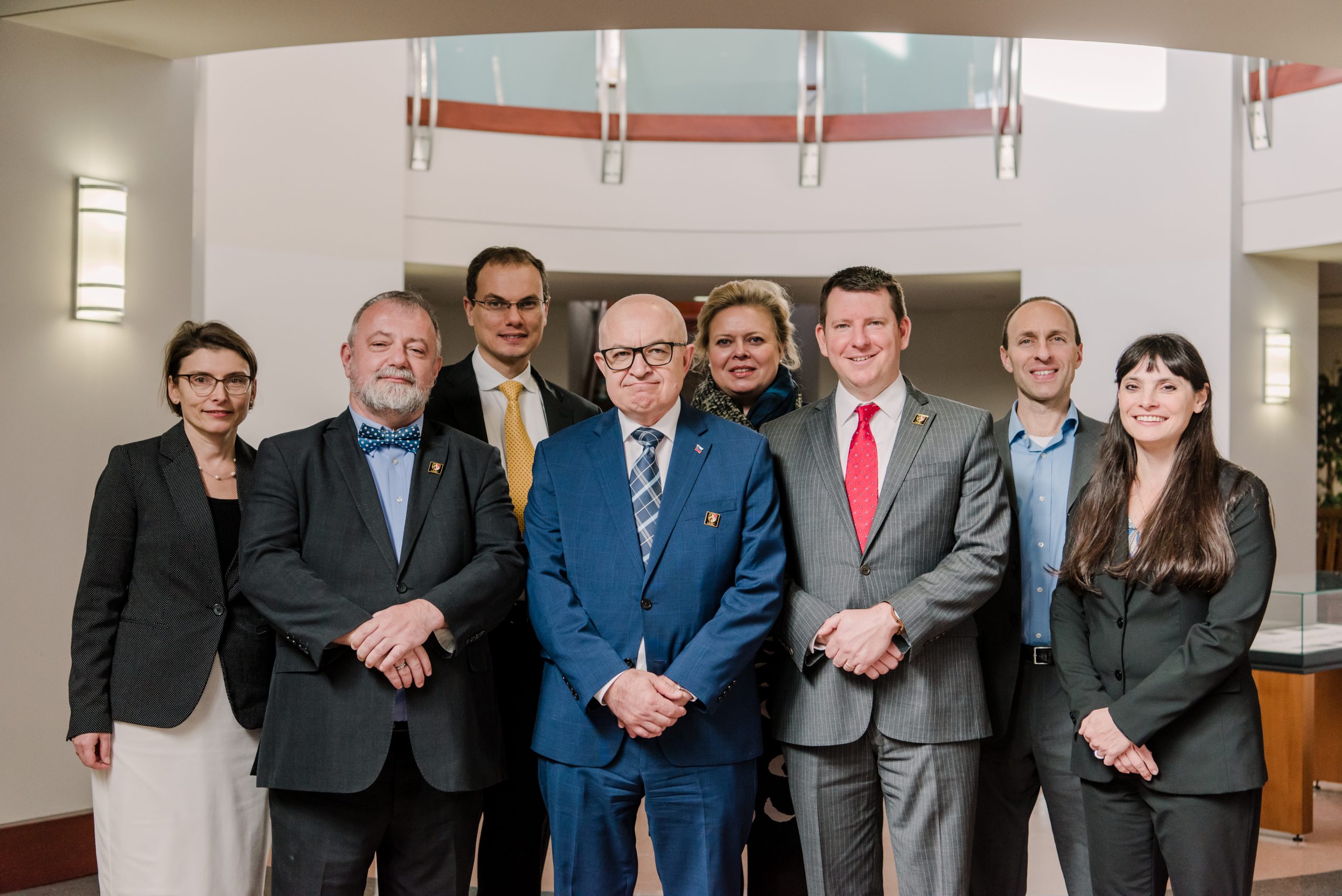Ambassadors from the European countries of Slovenia, Estonia, and the Czech Republic convened at UMBC this month as part of the first joint European Union (E.U.) State outreach trip outside of Washington, D.C. Delegations from over twenty E.U. member states participated in the day of engagement with Maryland state and local officials, students, educators, and environmental and trade organizations.
The visit’s aim was to showcase and further strengthen the close cultural and commercial ties between Maryland and European Union member states. The E.U. is Maryland’s biggest source of foreign direct investment. Over 100,000 jobs in Maryland have been created due to trade with and investment from European Union member states.
The three leaders who visited UMBC participated in a panel at the Albin O. Kuhn Library, moderated by Brian Grodsky, professor and associate chair of political science. They included Stanislav Vidovič, ambassador of Slovenia to the United States; Jonatan Vseviov, ambassador of Estonia to the United States; and Hynek Kmoníček, ambassador of the Czech Republic to the United States. In addition to discussing economic and policy matters, the leaders answered questions from students, staff, and faculty.
“We find it very practical out of Washington D.C., out of the diplomatic bubble, to meet the real people living in the States because you can get a refreshing perspective on the issues, where Washington D.C. is in the trenches of the party discussion. This allows us to get closer to the real voice of the real United States,” shared Kmoníček.

During the discussion session, Ukrainian student Danylo Leschchyshyn ‘22, history and political science, a Humanities Scholar and member of the Honors College, asked the visiting ambassadors about the hope of eliminating corruption in his homeland. The panel responded by discussing the importance of combating corruption as a means of upholding democracy through diplomacy and the rule of law.
“If you cannot handle corruption effectively, you will not only be unable to build a free society, but you will lose your freedom. The aim of corruption is to undermine the feasibility, the success of our societies. Our system of governance cannot coexist with corruption that is out of control,” explained Vseviov.
He continued, “Ukraine’s challenge is not only about how it handles the war in the east. Ukraine’s challenge is also the battle that is taking place in the hearts and minds of every Ukrainian. That battle is a battle of corruption and whether Ukrainians believe they have managed to take their country back not only from foreign interventions but also from their own corrupt businessmen.”

Romy Hübler, assistant director of UMBC’s Center for Democracy and Civic Life, shared her experience growing up in East Germany before the fall of the Berlin Wall. She asked the guests about how older adults in post-Soviet regions are experiencing democracy today in ways different from the theoretical democracy they imagined during the Cold War. Hübler found the ambassadors’ descriptions of life during the Cold War—without democracy, and with human rights abuses and limited freedom—to be familiar.
“I have never had the opportunity to hear firsthand from representatives of Eastern European countries about their experiences and their thinking about their country’s path toward democracy as well as challenges that still persist,” explains Hübler. “I believe that we have much to learn from one another about those pathways, not only in Eastern Europe but also in the United States, including how people who live in these countries feel empowered or disempowered to participate fully and shape their futures.”
Banner image: (Front row, L to R) Ambassador Hynek Kmoníček; Ambassador Stanislav Vidovič; Ambassador Jonatan Vseviov; Carolyn Forestiere, associate professor and chair of political science. (Back row, L to R) Member of the E.U. delegation; David Di Maria, associate vice provost for international education; Irina Golubeva, associate professor of intercultural communication; and Brian Grodsky, professor of political science. All images by Marlayna Demond ’11.
Tags: CAHSS, CS3, Political Science, Public Policy

